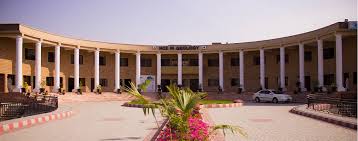- Advertisement -
PESHAWAR, Feb 19 (APP):The Fourth International Conference on Sustainable Utilization of Natural Resources commenced here on Wednesday at the National Centre of Excellence in Geology (NCEG).
The two-day event brings together global experts, researchers, and academics to discuss key challenges and advancements in the sustainable management of natural resources, said media coordinator of NCEG.
The conference is sponsored by SUPARCO, Pakistan Science Foundation, Pakistan Scientific and Technological Information Centre, Directorate of Soil and Water Conservation Khyber Pakhtunkhwa, Central South University (China), Giant Sequoia AI Technologies, and G-SAG.
Various stakeholders have also set up exhibition stalls to showcase their contributions to sustainable resource management.
The inaugural session began with a welcome address by Dr Syed Muhammad, followed by the keynote speech from the chief guest, Dr Amjad Ali, Director General of SUPARC Wing, SUPARCO Islamabad.
He emphasized the importance of effective management of research data and accurate analysis in geological studies.
Prominent scholars, including Professor Dr Muhammad Qasim Jan and Professor Dr Muhammad Tahir Shah, also shared insights on the significance of collaboration and innovation in sustainable resource utilization.
Professor Dr Liaqat Ali, Director NCEG, expressed gratitude to the organizers and participants while highlighting the center’s contributions to academic and research excellence.
Leading researchers presented their studies on various aspects of natural resource management and environmental sustainability. Dr Jim Toktali, Trakia University, Turkey discussed the impact of COVID-19 on the water quality of the Meric-Arda River Basin, shedding light on the environmental consequences of the global crisis.
Professor Dr Sardar Khan, University of Peshawar examined the quality of drinking water in Khyber Pakhtunkhwa and its potential health risks, addressing the challenges of pollution and public health.
Professor Dr Khan Shehzada, UET Peshawar stressed the need for innovative and climate-resilient building materials, advocating for sustainable construction methods.
Dr Irfanullah, Bacha Khan University, Charsadda presented a study using geospatial and remote sensing techniques to model debris flow in the Ochar River.
Professor Dr Muhammad Afzal,National Institute of Biotechnology and Genetic Engineering, Faisalabad shared a successful case study on cost-effective and sustainable floating treatment wetland technology in Pakistan.
Dr Rehan Mehmood, nstitute of Space Technology, Islamabad delivered an engaging presentation on the role of CubeSats in space exploration and education, highlighting the revolutionary impact of small satellite technologies in environmental monitoring and space science.
A special session, organized by SUPARCO, focused on space science, remote sensing, and their applications in environmental sustainability and geohazards.
Key speakers included Dr Amjad Ali, Dr Saeed Rehman, Director, SPARC Peshawar, Dr. Matiullah, General Manager, and Dr Zaheer Ali, Deputy Chief Manager, SUPARCO, who emphasized the role of space technologies in resource management and climate monitoring.
Another session explored climate resilience, geotechnical studies, and sustainable innovations. Professor Dr Laura Zucconi, University of Tuscia, Italy presented her research on Antarctic soil fungi and their response to climate change
Muhammad Shehab, King Saud University, Saudi Arabia discussed the spatiotemporal evolution of water bodies in the Tarbela Dam area, underscoring the role of satellite technology in monitoring water resources and drought effects.
Additional invited researchers presented studies on sustainable resource utilization. Professor Dr Bushra Khan, University of Peshawar)l provided in-depth analysis on environmental studies, while Dr Zahid Rauf, Pakistan Forest Institute, Peshawar discussed climate reconstruction using dendrochronology.
Subhanullah , NCEG, Peshawar compared limestone and dolostone geotechnical properties in the Upper Indus Basin.
Dr Muhammad Waseem, UET Peshawar emphasized the significance of seismic zoning maps for sustainable infrastructure planning in Pakistan.
Shahab Alam, Bahria University, Islamabad presented research on the impact of marble waste on the Kabul River in Khyber Pakhtunkhwa, highlighting concerns over industrial pollution.
With a wide range of research and discussions, the Fourth International Conference on Sustainable Utilization of Natural Resources has begun on an impactful note.
The event serves as a crucial platform for knowledge exchange, fostering collaboration, and advancing research on sustainable natural resource management.

